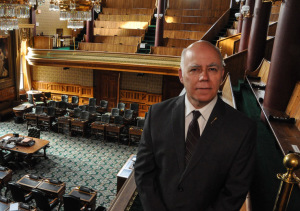Bill 15: The Regulatory and Accountabilities Act

April 26th, we spent most of the day at the Committee on Economic Policy studying and proposing amendments to Bill 15, the Regulatory and Accountability Act. This bill has its origin in a Memorandum of Understanding signed between the Premiers of Nova Scotia and New Brunswick on March 24, 2015 to pursue a collaborative agenda to reform the regulatory process to reduce costs to business. The Premier of PEI decided to sign on later that fall.
The Premiers have established a Charter of Governing Principles for regulation that includes a statement on using regulation to achieve public policy only under very specific conditions. It also includes guidelines for developing and accessing regulations.
Neither the Charter of Governing Principles for regulation, nor the MOU were released to the New Brunswick public or tabled in the Legislative Assembly, so I tabled copies today – nor was there any public consultation. Discussions only occurred with the Atlantic Chamber of Commerce and the Canadian Federation of Independent Business.
Where did I get the documents? I simply downloaded them from the Nova Scotia government website.
Nova Scotia drafted the original bill and passed it last year. It provided the boilerplate for the bills now before the Legislatures in New Brunswick and in PEI. It has also already established something called the Joint Regulatory and Service Effectiveness Office in Halifax to quarterback the agenda to review, harmonize and screen provincial regulations in all three provinces. This so-called Joint Office will receive input and advice from an advisory board exclusively comprised of representatives of the private sector, rather than a diverse board of representatives from the private enterprise, non-government organizations, labour unions and other sectors. This establishes a relationship between the regulators and the regulated that is just too cozy.
Bill 15 establishes an open-ended, undefined process for evaluating regulations, effectively giving a blank cheque to the Premiers’ office to define their own criteria for evaluation. This usurps yet more power from the Legislative Branch of government by the Executive Branch as proposals to create, amend or repeal regulations are never made in the Legislative Assembly.
I fully support improving regulations in the interests of protecting the people and communities of New Brunswick, enhancing and safeguarding our economic security, and restoring our environment. That’s not what Bill 15 does.
When other governments become involved in influencing our policy process, as is intended here, local democratic control can be diminished without the appropriate engagement of the public and their representatives in the Legislative Assembly. To this end, I proposed three amendments, all of which were defeated by the government members of our committee.
I proposed to insert a requirement for public consultation, a requirement to engage the Legislature, and an undertaking to strengthen institutional mechanisms to preserve the public interest, promote integrity and minimize the risk of corporate capture.
I voted against Bill 15, because for me it is important to defend the authority of the Legislative Assembly of the Province of New Brunswick to maintain control over our public policy process, and to assert the right of New Brunswick citizens to be engaged and consulted.